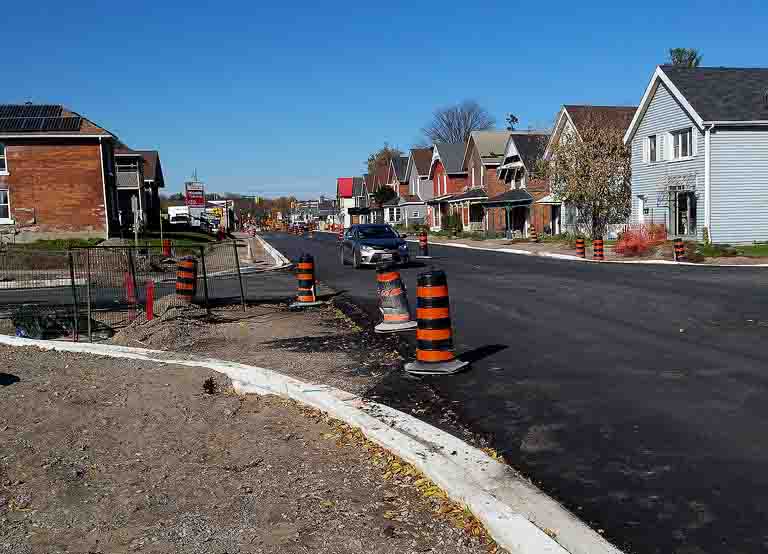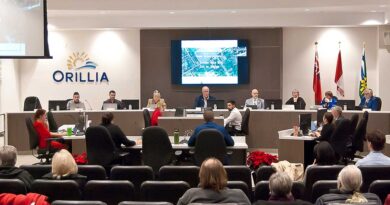Farmers’ Market Declining Revenue
By John Swartz
Orillia council had a report from the Farmers’ Market management committee and a request for emergency funding on their agenda Monday. The chair of the market committee, Shawna Ballik and market manager Amy Mangan stated the number of vendors has been declining in recent years. Ballik also said there has been a bit of good news.
“In 2019 we have begun to see a slight incline in new vendor attendance who have been drawing in new and returning customers,” said Ballik.
Annual budgets have been steadily declining reflecting falling revenues since 40 vendors departed the downtown Market Square location in March 2014 for the Orillia Fairgrounds Farmers’ Market. This resulted in additional money appropriated from reserves each year (except 2016) to balance even lower revenue against reduced budgets. Budget shortfalls have been as high as $8,000 and this year’s projected deficit is $6,781.
“It is also important to note farmers markets across Ontario are facing very similar challenges. It’s largely driven by changing retail trends, a decreased number of growers and an increased number of competing markets. With that in mind many markets have chosen to abandon their true market status, whereas the Orillia Farmers’ Market, despite challenges, has succeed maintaining that 51% grower ratio, thereby maintaining our true market status,” Ballik said of the difficulty faced to retain designation with Farmers’ Markets Ontario.
The 2019 budget started at $33,021 revenue expectation and was reduced to $21,627 projected. Even by cutting more than $4,500 of expense, the market will lose money on operations.
The market management committee is developing strategies to try and turn things around. Three working groups – parking, marketing and event development – are being formed to find solutions.
“We have a commitment from our management committee members to put in the leg work, so to speak, to develop these strategies. Following this presentation our intent is to formulate a presentation to our vendors to ask them participate as well. We do think that the key the market success lies in renewing our vendor’s investment in the market’s success. Historically the ownership has been on the vendors to encourage the people to come out and we’d like to see that passion return,” said Ballik.
Councillor Dave Campbell moved an amendment to forward the report to the City’s communications and tourism staff, which would permit assistance in a revitalization plan.
“It’s difficult to have people, even on the committee, that have all the skills that are necessary to not only run the market, but promotions, etc.” Campbell said.
Mayor Steve Clarke wasn’t happy having to top up the budget again, but involving City Staff made it easier to support the motion.
“The one issue I do have, and it has nothing to do with the nature of the Farmers’ Market, is the precedent setting for their particular committee if the issue should arise again, and I love the steps you are taking to mitigate the chances of that happening, but the precedent setting for other committees that might come forward with similar asks should they find themselves in a similar situation,” Clarke said.
Condo Woe’s
The City’s director of development services met the common elements condominium working group half way on a list of things the group want the City to take action with.
Council agreed to require as conditions for draft plans of approval requirements for developers of common element condos to advise prospective buyers of the kind of corporation owning the common elements and long-term maintenance and repair costs; to turn over documents to condo corporations including final approval plans and ongoing operational and maintenance needs; and to also turn over documents relating to construction changes “as built” with stamped engineered approvals.
That addressed concerns from condo owners about believing they were not told everything they needed to know by developers, real estate agents and lawyers before they bought.
Currently the city has 17 common element condo developments (518 units) of the type like the North Lake development on Laclie Street North. Ontario has several different definitions for condos and this type has different rules than apartment building style condos.
This bigger issue with condo owners was taxation and municipal services. Owners claim they are taxed the same as other housing developments but do not get the same services (garbage pickup, show clearing, road maintenance, etc) and their real concern is when underground services and roads have to have major repairs.
Condo owners wanted the City to take over maintenance of roads and infrastructure.
“It’s a form of ownership that would have to undone and a new form of ownership created,” said department director Ian Sugden. His report also stated taking over common elements in this manner fromm all the developments in the City could cost more than $1 million.
The working group originally asked to have their mandate expanded to include investigating Orillia taking over the common elements, but Sugden’s report outlined the province set the rules and there is little the City can do, short of assuming ownership of common elements, which the Planning Act prevents, and if it was possible condo boards would have to agree and all it would take is one condo owner to disagree to prevent that move.
Sugden also told council adopting the motion to require disclosures would not apply to all condo developments.
“The recommendations in the staff report would only affect about 50% of applications going forward and only affect those going through draft plan of approval,” Sugden said. Approximately half of all approvals fall under a condo exemption , which bypasses several steps in the approval process, including the ability to apply the conditions above.
Councillor Pat Hehn asked if the City could not use the condo exemption and force all developers to go through the longer process so buyers get the benefit of the disclosure conditions.
“Council could consider not allowing condo exemptions and just running with the standard plan of condominium. That would of course put us in a less competitive position with other municipalities around us where we would be making development more costly and more burdensome than others around us. It’s a financially attractive route for developers to go through and if they can develop easier elsewhere they often choose to do so,” Sugden said.
Because staff believed there was nothing more to be done other than adopting the disclosure provisions, the motion also disbanded the condo working group.
Downtown Redevelopment

With all the roadwork underway and planned in the next three years, staff prepared a report on the timeline and cost with an eye to where redeveloping Mississaga and side streets in the downtown core fits in.
“As far as timing goes, this is so council, through budget deliberations, can understand where it could a fall. It’s clearly shown as no funds available because of all the other competing road and infrastructure projects that are fully utilizing all the reserve funds we have,” said Wesley Cyr, manger of engineering and transportation.
The objective was to send the report to budget committee so council can debate how to fund the currently estimated cost of $18 million in the context of costs for the remainder of Front Street reconstruction and the next project – redoing Centennial Drive. Staff placed the Mississaga Street project in four annual phases beginning in 2024.
“I do believe this a project that needs to be contemplated now no matter when the shovel actually goes in the ground. It’s a comprehensive process. If we approved it at budget in some way, shape or form in the next couple of months it will still be a number of years before construction can take place,” said Mayor Steve Clarke.

Several questions were raised about funding, and some answers given, but mayor Clarke said being specific now isn’t as important as getting the Mississaga Street project in line.
“This is a significant amount of money. I’m not sure it’s this council that needs to contemplate exactly where that money is going to come from. I think what this council needs to do is articulate where the money could come from,” said mayor Clarke. He also said there is more to consider than just cost.
“We may need to add some staff if we’re going to add projects like this,” Clarke said.
![]()







